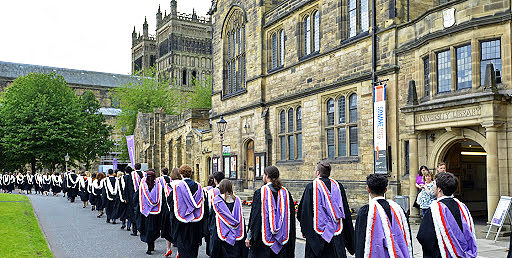At last a minister has said it publicly. Fewer undergraduates in 10 years time would be “a good thing”. Skills minister Alex Burghart is clearly no enemy of higher education in principle — he has a Phd in Anglo-Saxon history and taught at both Kings in London and Leicester universities — but his remarks at a talk at the think tank Policy Exchange yesterday were strikingly realistic:
The university lobby likes to characterise such talk as privileged people “kicking away the ladder” but the truth is that the ladder is leading nowhere for a substantial minority of undergraduates doing second rate courses for which there is no labour market demand.
For some decades up to the 1980s Britain under-supplied higher education and now it is oversupplying it, while technical education has been allowed to wither. Moreover, it is oversupplying a particularly narrow “classical” kind of full-time, academic-generalist, three year degree course, mainly residential and aimed predominantly at 18 year-olds funded by student loans.
This has been very expensive for the taxpayer, with only about half of fees being repaid, with no evidence of the promised improvements to productivity or social mobility. It has caused the number of mature students and part-time study to fall off a cliff, and as parents and now employers increasingly realise it is also sub-optimal for a substantial minority of graduates themselves, one third of whom are not in graduate jobs 10 years after graduating.
In the short-term numbers going to university will continue to rise — partly because schools are mainly judged on their success in sending pupils into higher education (HE) and because almost 40% of jobs are now graduate only (many quite unnecessarily so).
But the tanker is starting to turn. Thanks to the growth of degree apprenticeships, the planned lifelong loan entitlement for all forms of post-school education and training, and some of the former polytechnics moving into higher technical courses below degree level, we are moving towards a universal tertiary education offer in which the classical full-time university degree plays a smaller role.
Add to this the possibilities of online HE made clear by the pandemic. Everyone with the ability and the intellectual curiosity should be encouraged to expand their minds at university, using a mix of online and in-person study, and not necessarily at age 18. Many more should go in their late 20s, 30s, 40s and 50s, after a period of working.
Recent governments can claim some credit for putting the brakes on the over-expansion of HE but there is still much work to be done in making the alternatives more attractive, especially for school leavers. Only about 8% of school leavers go directly into apprenticeships. The system is particularly difficult to navigate for smaller companies which are over-represented in the areas the Government is trying to level up. T levels, the vocational alternative to A levels, have made a shaky start.
The public sector should set a better example in its apprenticeship offer and post-Brexit it should now be possible for state procurement policy to require companies to hire apprentices — perhaps one for Jacob Rees-Mogg to look at in his role as Brexit benefits minister?
Meanwhile, employers complain about skill shortages, especially in construction and IT, made worse by the end of free movement, but still have a poor record of investing in training. The Further Education colleges that ministers now heap praise upon remain financially fragile and struggle to recruit staff when schools can pay significantly higher starting salaries.
Over the next decade we will see a much more varied post-school education and training menu with university less of an automatic choice even for middle-class children whose parents have degrees. But the devilish detail in the provision of decent vocational and technical training needs consistent focus — let’s hope that Alex Burghart stays in his job for more than a few months.











Join the discussion
Join like minded readers that support our journalism by becoming a paid subscriber
To join the discussion in the comments, become a paid subscriber.
Join like minded readers that support our journalism, read unlimited articles and enjoy other subscriber-only benefits.
Subscribe